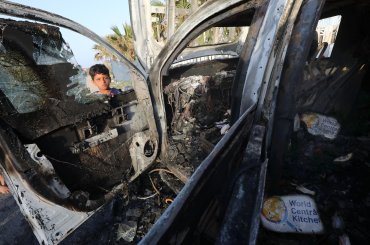Rapper Vic Mensa has published a wrenching piece in Time Magazine about “oppression and abuse” in Palestine. He saw elderly women being “punched in the face” by Israeli soldiers, saw hundreds of children being harassed and detained, and felt a solemn obligation to bear witness. But check out two of the opening sentences in the article:
I am not anti-Semitic, and the views expressed in this essay are in no way an attack on people of the Jewish faith. My words are a reflection of my experiences on my trip, and my criticism lies with the treatment of Palestinian civilians by the state of Israel, no more and no less.
Those words are an insult to the essay itself. They were obviously stapled in by Mensa’s minders, the editors. I say this as someone who has been in the editorial business forever (i.e., I don’t know it for a fact); but the article has nothing to do with Jewishness.
Vic Mensa went to Palestine last summer “with a group of African-American artists, scholars and activists organized by Dream Defenders,” and he is describing racial discrimination the U.S. supports with emotional images anyone can understand. The crux of the piece is a scene from a rooftop in Aida refugee camp, when Mensa looks from the Palestinians’ water supply to the Israeli settlement across the wall.
many people in the group cried on that roof. Rage cannot describe how I feel thinking of the insects swimming in that water tank, while just across the wall is an Israeli settlement with an Olympic-size swimming pool.
Mensa’s mission is clear. These words halfway thru should have been the lead:
Herein lies the purpose of this composition. I write to inform all those who will hear me of the treacherous denial of human rights to the Palestinian people living under occupation. These scenes of oppression and abuse will be forever etched into my memory, burned into my mind’s eye.
Forever etched– read Mensa’s view of the horror of occupied Nabi Saleh (the scene recently of the Ahed Tamimi slapping incident, after her cousin was shot in the face):
In a West Bank village called Nabi Saleh, I saw the most graphic account of these crimes against humanity I would be exposed to whilst in Palestine. The people of Nabi Saleh have mounted a long-term, non-violent resistance to martial law that the Israeli Defense Forces (IDF) have responded to with extreme brutality. We sat in silence and watched a series of YouTube videos filmed by villagers of soldiers terrorizing the demonstrating civilians, primarily women and children. The videos show hundreds of metal tear-gas canisters raining on peaceful protests, elderly women punched in the face, children beaten and arrested, and even a villager whose face was literally removed by a gas can at point blank range…
The theme of the article is that conditions in Palestine are reminiscent of the treatment of black people in the U.S., but the discrimination there is worse.
As with the black community in the U.S., the use of incarceration, racial profiling and targeting the youth as methods of control are heavily prevalent in the occupied West Bank. The main difference I see between our oppression in America and that of Palestinians is how overt and shameless the face of discrimination is in the occupied West Bank. As much as we ruminate on our metaphorical police state in Black America, martial law is a very real and tangible condition in Palestine…
For once in my life I didn’t feel like the nigger. As I sat comfortably at a coffee shop, gawking at a group of Israeli soldiers harassing a Palestinian teenager, it was clear who was the nigger.
The last paragraph reveals Mensa’s understanding of and commitment to the Palestinian people.
They have been made strangers in their own land, second-class citizens in the home of their forefathers, but they refuse to be a memory. They fight as if their existence depends on it, because it does. And all they ask of us is to tell their story.
Now go back to those first lines. They are out of voice. The editors insisted on them. And the words confuse the point. Israel calls itself the Jewish state, but it is in reality a Zionist state. Zionism discriminates between Palestinians and Jews. Many Jews support Zionism, including many in the Jewish establishment; but an increasing number don’t.
Ask yourself, Does the editors’ insistence have anything to do with the fact that Gary Ginsberg, a top executive at Time Warner, writes speeches for Benjamin Netanyahu? The answer is obviously, Yes. Not that Ginsberg was copied on this piece. But what the disclaimer and Ginsberg’s sideline speak to is the fact that Israel supporters are imbedded all over our media, and this is never controversial. Netanyahu and his catspaw Sheldon Adelson set Trump’s policy in the Middle East — the media doesn’t raise an eyebrow. Israeli businessmen are into Jared Kushner and his family for millions of dollars, and Kushner’s family supports illegal Israeli settlements… but that’s not an issue.
When an elderly Palestinian man urges Mensa to “Place pressure on the U.S. government to place pressure on Israel,” we know where that pressure should go first: to the Israel supporters in the establishment.



I wouldn’t put it quite the way you did Phil. I agree that the opening remarks are there because of the subconscious racist assumption Americans have been indoctrinated in—if you criticize Israel as harshly as it deserves you are guilty of antisemitism until proven innocent, because nobody could legitimately be that outraged by crimes against Palestinians. No, it is probably really that you are motivated by antisemitism, because Palestinians don’t matter.
It is a viciously racist assumption, but because we live in a racist society most people adopt a defensive crouch on the subject. I don’t know who wrote those lines, but they weren’t necessarily written with bad intent. They might have been intended to brush off the criticism we all know is going to be leveled at the piece. I agree, though, that it is way past time to get out of the crouch. Wait for the cries of antisemitism to begin and then point out the racism.
Many thanks for drawing attention to this essay, Phil. It’s possible that Mensa would have wanted, without too much editorial prompting, to open with an emphatic disclaimer of the prejudice of which he was bound to be accused. The Time headline, in which he allegedly learns about American racism from experience in Palestine, is much more obviously written from another point of view, not his – he was in fact using his experience of American racism, ‘being the nigger’, to understand and communicate the enormity of anti-Palestinian racism and religious fanaticism. But this way of putting things would not be acceptable in Western mainstream thought.
My only quibble with the article here is that it makes Mensa, at least on first reading, look like a direct eyewitness to a punch in the face delivered to an old lady, whereas I think he says, when he comes to be quoted, only that he saw video of such shocking events.
grammy nominated Vic Mensa is an extraordinary voice. he’s started a hashtag #WeCouldBeFree and #WeCouldBeFreeIf. check out his video
https://www.youtube.com/watch?time_continue=2&v=SQqUuzIlb2k
it unfortunate, when referencing state power, people feel the need to preface that reference with a defense of oneself. i have no certainty this was an editor’s choice, much less “obviously” so. it could be that mensa has simply incorporated what has become a societal norm, to distance himself from a meme of “israel” = “the jewish people”. a meme perpetuated by state power and our media.
i’m not sure it “insults” the essay (a great essay). but it does sort of insult our intelligence. it’s an insult to us all, as humanitarians or civil rights workers, we must address and defer to the propaganda of the oppressor before telling our stories. if it’s important to mensa, to any of us, to address this issue of the state vs “jewish people” and/or anti semitism, for clarity’s sake or any other reason, it’s unfortunate one feels that message needs to preface the primary focus of the article.
but maybe he was explaining this not to us, but to people who have been brainwashed. it’s really true that out there in the world today people fear criticizing israel and we shouldn’t. so maybe he was trying to reach those people.
phil’s right in that the article has nothing to do with Jewishness. but i can’t agree with him mensa didn’t write the preface.
Jews and Judaism are the human shields of Zionists, employed:
– to justify the past and on-going evil of Zionism;
– to deflect legitimate criticism levelled against Zionists and their oppressive, colonialist, (war) criminal and religion-supremacist “Jewish State” construct; and, if/when/as required,
– to redirect blowback onto non-Zionist Jews.